#that's a natural part of life and not a moral failure
Note
Do you think that George and John would have fixed their relationship had John lived past 1980? Because I don't.
I'm probably the wrong person to ask about this because in general I'm not a fan of speculating about what a person would or wouldn't have done had they lived. One of my favorite pieces of advice I ever got was when I was tutoring disadvantaged students during college (the best job I've ever had) and my supervisor told me potential is unknowable by definition. Meaning it's just as misguided and counterproductive to say someone has a lot of potential as to say they have no potential, because that's just not how that word works. Partly because people are dynamic and changeable but also because there are recesses of our character that no one, including ourselves, can be aware of.
So I truly don't know what would have happened between them, and I don't think you know either if I'm being totally honest. But, to throw all that out the window and speculate anyways, I think the most realistic answer is: Possibly.
I think it's fair to say that John and George were both highly mutable individuals, and that of the four beatles they spent the most time and energy trying to understand the self and achieve some kind of self awareness and personal growth (even if those attempts were sometimes misguided -- I'm looking at you, primal therapy). And I think in this case their mutability is both a complicating factor and an indication that reconciliation really was a true possibility for them.
John was making enormous strides in his mental and emotional health at the time of his death, and it's entirely possible that might have led him to feel differently about George over time, or to simply decide he didn't want to put energy towards being angry at him anymore. (Not to equate letting go of anger with being adapted/self-aware – just that that’s one way growth can manifest, it’s definitely not the only one or the best one.)
For his part, George was very vocal both musically and irl about all the ways he felt he needed to change/grow, though of course whether he ever got there is a difficult question to answer. His views on forgiveness are really interesting here (and sometimes a little magnanimous, tbh) but one thing that initially surprised me is that Paul credits George with convincing him to forgive Yoko.
(Which I guess just surprised me because I always believed the conventional wisdom that Paul is the sweetie and George is the cranky guy, but obviously that's a very limited snapshot of both of them.)
Anyways, to me the fact that George was putting time and energy towards learning to love Yoko implies that he may have been hoping or wanting to relearn his love for John as well (if he hadn't already.)
So I do think it’s possible that at some point in the last 40 years they’d both have been in a mental space to want to interact positively with one another again. It's not something that was guaranteed to happen, and I don't think we can even fairly say it was probable or improbable because that implies a level of knowledge of their souls that no one has or has ever had, but it's not outside the realm of possibility.
On a related note, another thing I've found kind of profound in analyzing the beatles (or anyone) is the line “The wounds of childhood do not heal” (Maryse Condé, Crossing the Mangrove.) Which is to say that the pain we experience as children shapes us so profoundly that every experience we have as adults is seen through the lens of that pain, and we reenact our childhood and our childhood family systems again and again without healing.
Now, in the case of the beatles, I think it’s a little blurry what constitutes childhood and what constitutes a family system (“family” system being a misnomer because every close collection of people has the tendency to form a system). Because they found each other as adolescents, and went through a life changing and arguably traumatic experience at a very young age that no one else could ever understand, the system they formed shaped them very powerfully and the wounds it instilled probably never healed, either.
I guess that's my way of saying that the four of them had kind of an extended adolescence, and they continued to reenact the system they built as adolescents in order to survive the insanity they were living in well into adulthood.
Since George was something akin to a forgotten child in this system, and Paul was something akin to a golden child, (both of which are miserable, horrible ways to live, btw – this trend of using golden child to mean “spoiled” is the dumbest fucking thing I’ve ever seen and also incredibly destructive to people who have actually experienced that trauma) those two really did have a tendency to be at odds with one another throughout their entire adult lives.
(Obligatory reminder that this is wild speculation and I'm not their therapist, or indeed any kind of therapist at all.)
But I think it’s that (and the fact that we tend to analyze anyone who touched Paul’s life purely through the lens of Paul) which tends to make people think George was fundamentally opposed to forgiving people who’d hurt him or allowing systems to adapt over time, even if that assumption doesn't really bear out in any of his other relationships. And, obviously, it's a little tricky to try to transplant the Paul/George relationship onto the John/George relationship and equate or even compare the two, because John played a very different role in the system and was a very different person from Paul.
Also, the fact that the wounds of childhood do not heal absolutely does not imply that we'll always be a slave to them. Crossing the Mangrove is an amazing book about decolonization and intergenerational trauma but one of its most powerful themes was the idea that we can continue to build ourselves and build our world in the shadow of enormous pain. And we'll always be informed by that pain, but being informed isn't the same as being defined.
All this is just to say it's very hard to anticipate what kind of changes John and George would have undergone in the last 20-40 years and whether those changes would have brought them closer together (or, if not closer together, would have encouraged a sense of acceptance towards one another.)
I also think there’s a conversation to be had about whether rebuilding that friendship would have actually been for the best for their mental and emotional wellbeing (a LOT of children from toxic family systems ultimately come to find that sorting through the pain isn’t worth it for the chance of reconciliation and that’s okay), but this is already way too long lol.
Anyways, thanks for the ask and sorry this turned into such a novel!
#I think this is in response to my saying it's okay for paul to hold onto anger#and I guess I'd say it's also okay for john and george to hold onto anger#and it's okay for you too#that's a natural part of life and not a moral failure#paul mccartney#george harrison#john lennon#the beatles#beatles#ask#anon
23 notes
·
View notes
Text
Yandere Batfam: Incentives
TW: description of yandere mentalities and actions (obsession, possessive tendencies, stalking, etc)
Tags: Yandere! Batfam x reader

Bruce Wayne: The Epitome of a Hero
Batman without fail has proven himself a near-perfect hero, impressive for the fact that he's first generation and had tackled Gotham's cursed land. But obviously, as with any being on earth, the stress of the facade weighs on him. The stretch between the isle of Bruce Wayne and the Scowl of Batman no longer cut clean. They blur and tear at him ravenously until he sometimes feels he is nothing but a ghost of obsession, of a boy in the middle of an alley with his parent's blood puddled around his knees.
Bruce, in essence, needs something to define himself, he is a man who cares for his partners painfully (each robin has chiseled a part of himself out) and yet he cannot choose them over his city (over his villains). He has nobody else to define who he is, he is nothing without them and as much as he loves being their father the cowl is the only thing he has left of what was once an unbreakable will
The darling plays a sort of anchor, a guide, a definition that Bruce can cling onto. For Bruce who cannot say confidently that he can live truly as either a civilian or a hero without regret, his darling is all he has to cling to. For even should he forsake his sacred code that defines him, forsake his morals that he clings to, and go off the deep end never to return he can still manage to drench himself in you.
You're in his bones, his flesh, and on his lips at all times of the night and day, the cowl and fatherhood are at his core and as they conflict, chipping away at him and forcing him into nothing but a broken mess you seep into the cracks and fill him up until all of him is nothing but you, you, you. Your scorn, your praise, all of what you say, you're what he can finally define himself off of.
It doesn't matter if your nails drag into his skin as a punishment, or even if you carve your woes into his flesh with a knife. He will take them as his law all the same he will revere your kisses, your soft touches, and your smiles. His unbreakable will is nothing in the end as long as he has you.
You have him in the palm of his hand, your word is law, you define who he is with your mood, whether he is a failure and must strive to be better or whether he can finally rest is all up to you.
Even from a young age when childhood should have been grass stains and scraped knees, Dick has always known an audience's eyes and dizzying heights. He knows his role, his actions and his expressions are all being watched, and taken into account and he knows best how to play the role of the easily lovable. Responsibility and acting all of this have been him forever, he's a natural at it. Basically, its second nature for him to mold himself into the one everyone likes, he knows the script and he plays it well
Richard Grayson: The golden boy
His entire life has been a role, something that he has to put his all into acting, the perfect robin, the leader of the titans, the leader of the young justice league, Nightwing-the vigilante who garners the respect of heroes and law alike. It is a tightrope walk of never-ending smiles and actions and if he slips it all comes crashing down and he cannot risk it. If he bows to the weight on his shoulders, even if it's all too much he has far too much to lose. Of course, he loves being loved, and he genuinely does love his family, loves his pseudo father and his little brothers and his friends but he knows who they love and it might not be him as a person.
The darling for him is a slow burn. a t first their a sort of self-fulfillment, just a little fix of appreciation from his favorite person, but the more he visits them, the more he drops some prefixes, is able to be a little rougher around the edges he gets lost in it, the brunt of his feelings finally flooding out from the cracks in his perfect facade and you're his addiction. He needs you to need him, to like him, to adore him he needs you to approve of who he is without the flashing lights and cameras. It's a strange mix of needing your approval to prove that he's still balancing, that the weight hasn't yet managed to take hold and drag him down, and needing you to see the fact that he is a broken grieving man. He's been used and weaponized and he just needs to know that outside of that Richard Grayson is still useable, love him outside of his role, be his everything meld your existence into his he's begging you
It comes to a point that he can almost no longer separate where you begin and where he ends, and he's never felt so intoxicated, so in love, because if love isn't the way he can barely focus, his brain clouding over and the way he basically turns into an animal for you, your loyal little dog he doesn't know what could possibly count. As long as he has your praise, your approval, and your need for him he's a brainless pet. Just love him, love him, love him or he might finally fall.
What many forget about the second robin is though he is the robin who crosses the lines others won't, the one who sees things to a more permanent end, Jason is the one who is more in tune with his emotions. They overwhelm him and lead him more than rationality but Jason has emotions, he bares his heart on his sleeve, and others are simply too blind to see it. Perhaps it's because of this strange self-awareness, of how fucked he is, how broken he is that he cannot delude himself in the same way his family does. He cannot seem to meld himself with you(how could something like him even think of being one with someone like you), but he's so desperate for the connection.
Jason Todd: The monster
In comparison to the other robins, Jason understands that he is replaceable. It's so easy to swap him out with any other broken street rat, hell he might even argue it would be an improvement. He's watched Gotham from its sewer, eyes glancing over crime alleys streets from broken street lights as a child, how women were beaten into submission by men with too much audacity and beer on their breath, how good men would be turned to corpses and looted, how children stood on corners and Gotham nods her head because his city is nothing it not vile and rotten in its core
He has known death intimately and hates life just a little bit more because there isn't anything he can feel truly justifies how Gotham lets the sewage and filth thrive. He's never had the luxury of childhood, of the safety of a child's innocence because he's aware that life isn't a gift, it's a cesspool of sin prepping souls on earth for hell. There's nothing good, but there are people who need protection from it and Jason goes about his days repenting for existing because there's no divinity, no god other than the men who see themselves on the top of the chain. There's no god before you.
His darling is a light, something near untouchable, someone who can do no wrong. Jason is the type of delusional where he can justify every single thing Darling can ever say or do, say the skies green and he’ll rearrange the dictionary just to prove you right. You in a sense define what is good or evil, something invaluable, something so good that they could even pity him. A benevolent deity bestowed open Gotham and he'd be damned if he let anything from the street touch you. Jason is the robin who came back wrong, the killer, the monster, the black sheep of the family of maniacs who want better from the world, and he's disgusting but he'll do anything for you.
In a sick way, he already knows well how his presence is painfully unworthy of you, but he longs, craves, and hungers for you all the same. He's reverent in his treatment. If he cannot connect with you by becoming one he'll be your loyal slave, your servant to the ends of the earth, his hands are already stained but even his own sins become virtues if there for you. He lives and breathes on you, everything he does is for you until the dead bodies piling his work are but offerings, sacrifices all for you. Carve a place in your body for him to reside, for him to leash himself upon so he can hide and forever more belong to you. A Divine and their monster acolyte.
Tim is a being born of neglect, constant patronization, rejection, and scorn. His only sense of motivation had been at first obsession without a sense of preservation. Tim has always known nothing but a world where he has to be able to provide to earn his right to stay, to exist. He knows intimately what it's like to be looked through, to be invisible, to have his own name replaced with another, or to have never been born, so like money he exchanges himself and all his actions in a transactional way. Every relationship for him is a simple give and take, he gives them what they want, and they let him stay and remember his name. As long as Tim is functioning and working he can't be thrown away, can't be truly invisible. As long as he is working he is kept.
Tim Drake: The Forgotten
Tim is smart, he knows how to run the table, and play the game and he does it well, he knows exactly how to pick apart everyone around him. Tears into them and learns, absorbs, and sees what they need, how he needs to act, what he needs to provide, and remakes himself for the sake of their approval. From the constant twists and turns of his character, Tim knows how to seek out the role, how to play it, how to thrive in it, Tim sees everything, and thus he is left feeling empty because nobody sees him. Something carnal in him screams for something, anything to tear him apart as well, to meet his obsession with their own.
His darling is someone who he needs to ruin him, he needs them to dissect him, to cut him up and tear away everything and covet his entrails. He's begging you to tear away at him, until Red Robin is nothing until Drake Wayne is but a far away title, and see him, see Time in all he is. Obsessive, disgusting, and desperate. He needs his darling to keep digging even as they see this and decide he's good enough to continue unraveling, to rip him open and keep something of him in your pocket.
As is apparent the relationship with his darling is almost masochistic in a way, with a clear power dynamic but what is to be noted is that while he is desperate he will never truly give up control. He knows when he is being manipulated, but he thrives on it, that you've picked him apart and have decided him worthy to manipulate, you get what he allows but he allows a lot for you. He wants his darling to devour him whole, to stitch themselves into a Frankenstein monster just as he has with them. Take on his mannerisms, remember his coffee order, his eye color, anything. He'd thrive just knowing they have a photo of him somewhere in their pocket. (as if it equates to the massive amounts of video he has on you, the photos, the cameras, the trackers, the microphones, the bugs, and chips)he just needs you to know who he is. He needs you to prove that Timothy Drake truly exists.
What most cannot see off the bat due to confident words and even more confident actions is that the most familiar feeling Damian is acquainted with is unsurity. He is a being born with a purpose, and the purpose was not to be human, it was to be heir, to be a leader to be everything that he needed to be. His life is a mix of criteria he needs to meet, of missions and proving himself and needing to be perfect, needing the validation of praise and a good grade. He is the heir of a league of assassins and yet he can no longer kill, he is the protege of a notorious hero and yet he contemplates lethality for too much, day in and day out Damian defines himself by this conflict and with true humanity alluding him, he cannot tell truly who he is.
Damian Wayne: The heir
The source of his need for competency comes from fear of inadequacy. Because if he cannot fit the criteria given, if he cannot prove himself worthy then does he even have the right to exist? When he has been born for a role he can no longer call his own, where does that leave him? Lost, he's lost and wandering and he thinks something is rotting in him. It plagues him, the fact that Damian Wayne is a leader, son, brother,heir but not human.
His darling in his case plays the role of safe haven, a little home in the form of flesh and blood where he can bury himself alive. He needs the surety they bring, there is no throne, no rubric or evaluation, there is only their own eyes and lips and Damian's own heart in their hands. They are his humanity, if Damian is a role then they are his wants and needs, they are his tears and very heart, he's sure if he could tear his chest open his darling would be there, cradled precisely within his ribs. In their arms Damian feels so painfully useless that he remembers he too has lungs that need air, that he too has basic needs, he feels helpless and ragged and he thinks that this sort of helplessness can be nothing but love.
Darling is living proof that Damian Wayne has something to himself outside of Robin, outside of al-Ghul, and outside of his last name. He is flawed, he sleeps and dreams and cries and is so very weak. He eats from the palm of your hand, everything that makes him disgustingly weak, mortal, he's putty in your hands, even if you were to feed him poison he would drink greedily. The thought of death, the foe that drove his grandfather to the pits over and over again, feels no harder than a feather brush with your arms around him.
Alfred: extra
Apologies
He is far too old to fancy himself a darling, and far too sensible to feel infatuation as strongly as his wayward family but he can care, and he can love and he would do anything for his family as he always has
Of course, he feels bad, lucid as he is he can see how they covet you, how they stress you and pull you so thin you might disappear but he cannot let you go, he hopes you forgive him.
He does pity you, is fond of you and your softer nature in the cave of monsters that lurk around for you as their sole prey and he’ll protect you as much as he can but ever since they've had you the manor has a bit lighter and they've smiled so much more he cannot truly let you go
He’ll provide everything but freedom, he'll coddle you through the transition and until he too must take his place in a grave but he begs of you to stay by his family of beasts
You're his only hope

Author's Note: Dipping my toes back into writing - if this seems familiar it's because it's a reupload! I was previously known as lovesick laboratories but my mental health took a nose dive but I'm back!
Tags: yandere batfam, yandere dc, yandere batfam x reader, bruce wayne x reader, dick grayson x reader, jason todd x reader, tim drake x reader, damian wayne x reader
#yandere batfam#yandere dc#yandere batfam x reader#bruce wayne x reader#dick grayson x reader#jason todd x reader#tim drake x reader#damian wayne x reader
688 notes
·
View notes
Text
✧ 2nd House Ruler (WEALTH & Family) in All Houses
Part 3 (Final) ..
{ Vedic Astrology }

Your Guide to Check Your Placement (Vedic Astrology)
⇝ Refer To My Part 1
2nd Lord in 8th House
The placement of the 2nd Lord in the 8th House indicates a potential for wealth accumulation in your life. This is especially favorable for those involved in real estate, as dealing with properties can bring significant financial gains. However, it's important to consider the aspects and the sign in order to fully understand the potential outcomes. Generally speaking, this placement suggests a promising source of wealth.
On the flip side, this placement can also bring challenges in your marriage or joint finances. There may be disagreements and difficulties regarding shared financial responsibilities. It is crucial to find ways to calm these tensions and strive for more agreement with your spouse. Failure to do so can lead to further complications. Additionally, if you have elder siblings, they may also become a source of contention for you. It is essential to maintain harmonious family relationships in order to ensure a steady flow of money in your life.
The 8th House also governs inheritance and money gained from others. With the 2nd Lord placed in this house, if it is well aspected and has a beneficial aspect from the Lord, there is a potential for receiving inheritance and accumulating enormous wealth. However, it is important to exercise caution in your business dealings if the 2nd Lord is placed in the 8th House. This house is associated with secrecy, and there is a possibility that you may be secretive about your investments, business dealings, and taxes.
Engaging in any underhanded activities can have severe consequences and leave a significant dent in your finances. The 8th House is known for its transformative nature, and you may find yourself having to start from scratch and transform your savings and investments from time to time. Due to the placement of the 2nd Lord being seven houses away from its own house, you may experience a sense of financial instability.
There will be periods of financial security, but there will also be times when everything feels uncertain. It is important to adapt to these fluctuations and learn to make a profit from them. Overall, the placement of the 2nd Lord in the 8th House suggests both opportunities and challenges in terms of wealth accumulation and financial stability. By navigating these complexities with caution and adaptability, you can make the most of the potential benefits and overcome any obstacles that may arise.
2nd Lord in 9th House
This is an advantageous position for your wealth. You have a natural talent for accumulating wealth in your life. However, there is a slight issue that arises from this - you tend to hold onto your money tightly. It's difficult for you to let it go and allow it to flow freely, which can have a negative impact in the long run. The reason behind this difficulty lies in the fact that the lord of the second house has moved eight houses away from its original position. This eighth house represents fear, and as a result, you fear letting go of your wealth and spreading it around through expenses.
Your reluctance to let money go prevents it from flowing back to you. Despite your good fortune, it is important to maintain it by spending when necessary and utilizing the money you have. On the bright side, having the second lord in the ninth house makes you a highly skilled and diligent individual. You may even experience gains through speculation, such as in the stock market. However, the placement of the second lord eight houses away can bring about health issues in your childhood or early years.
Nevertheless, as you enter your middle years, you will experience prosperity and stability due to the influence of the second lord in the ninth house. The second lord represents moral and family values, and its placement in the ninth house makes you a person with strong religious and spiritual inclinations. You are drawn to pilgrimages, philosophical discussions, and seeking guidance from gurus. These pursuits bring you peace of mind, which in turn aids in your wealth accumulation. Furthermore, the placement of the second lord in the ninth house suggests the potential for expanding a family business into new areas, particularly foreign interests.
This can be highly profitable, especially if there are positive aspects to the second lord in the ninth house. Additionally, since the ninth house represents the father, it is common to see individuals in this position taking on their father's business. The ninth house also governs higher education, and pursuing further education can be a source of profit for you. You may excel as a teacher or lecturer in various fields, and higher education in any area will contribute to your increased income.
2nd Lord in 10th House
The 2nd Lord in the 10th House placement signifies that you are a person of great honor. Your reputation in your career is built on your integrity and the trustworthiness of your word. With the 2nd house ruling speech and entering the 10th house of career, it is important for you to find a profession where you can utilize your talent for communication. This could range from teaching and lecturing to media and journalism, or even politics. Your ability to effectively communicate will bring you wealth and success.
Your family of origin plays a significant role in supporting your career. They may provide you with education, financial assistance, or even a substantial inheritance. Pursuing education will greatly benefit your career and help you achieve financial gains. However, it is crucial to be cautious of the company you keep. Surrounding yourself with negative or toxic individuals can compromise your integrity and hinder your wealth-building opportunities. Choose your associations wisely and ensure that they are morally upright individuals.
Additionally, it is advisable to refrain from speculation or gambling, as it can lead to significant financial losses. Consistent hard work is the key to continuously increasing your profits. Any slack in your dedication, cutting corners, or displaying antagonistic behavior towards your superiors can result in immediate negative consequences, including the loss of your job.
Furthermore, it is important to maintain a healthy relationship with your children. Be mindful of giving them excessive amounts of money, as it can potentially strain your bond with them. Avoid spoiling them and instead focus on nurturing a balanced and loving relationship.
2nd Lord in 11th House
When the 2nd lord takes its place in the 11th house, it brings forth an abundance of wealth into your life. You have the potential to attain great riches through this placement. It particularly favors property deals and long-term investments. This position is highly advantageous for those pursuing self-employment and any form of business ventures.
Additionally, it signifies an increase in wealth after marriage and through partnerships. Your financial prospects are bright in these areas. However, it is important to note that there may be conflicts with your mother regarding financial matters. Awareness and effective communication can help navigate these potential disagreements.
With the 2nd house lord's presence in the 11th house, you possess a strong sense of honorable duty towards your profession. This makes you enterprising and dedicated to your job. If you are currently employed, this placement brings recognition and fame within your workplace. It opens doors for you to attain a high-ranking position. Moreover, your colleagues will prove to be supportive and instrumental in your growth and promotion.
2nd Lord in 12th House
When the lord of the 2nd house finds its way into the 12th house, it ignites a fiery courage within you. You become an adventurous soul, unafraid of starting anew in a different career or even a different country. Starting from scratch holds no fear for you, as you possess a true sense of adventure and freedom that is invaluable. I have witnessed individuals with the lord of the 2nd house in the 12th house completely transform their careers in the middle of their lives, achieving great success.
People are naturally drawn to you and will support and promote you because of your likable nature. However, this position also makes you prone to being a spendthrift. Money seems to slip through your fingers effortlessly. The more you earn, the more you spend. You possess a generous spirit, but struggle to maintain control over your finances. It may be wise to seek assistance from someone skilled in money management. The 12th house represents our fears, and in this placement, you tend to avoid looking at your bank balance. You prefer not to worry about it and simply turn a blind eye.
On the flip side, the 12th house is also associated with charity, and you find joy in giving to various causes. Your acts of kindness will bring positive karma into your life. Despite your own financial struggles, you have a knack for helping others manage their money. You could excel in financial management, particularly when it involves handling other people's finances or investment funds, even in foreign lands.
There may be challenges with a child, as they can be a bit quarrelsome and cause you distress at times. However, with time and effort, you will be able to work through these difficulties.
Feel free to share your experiences in the comments!
Remember This is a General Analysis , Whole Chart is to be consider for Accurate Personalized Predictions..
For Paid Personalized Analysis & Reviews ➤ Check Here
Masterlist ➤ Check Here
🤗 Feel free to chat with me if you have any questions about my service. Don't hesitate, I'm here to help!
#astro observations#astro notes#astroblr#astroloji#astroworld#astrology#astro community#vedic astrology
303 notes
·
View notes
Text
I think one of the things that gets lost in the big, endless internet conversation about whether or not heroes should kill their villains is the fact that killing villains off robs you of a lot of story-telling potential. The Joker died at the end of his debut story in Batman - imagine what Batman would be if he stayed dead. No Joker in Batman 66, no The Killing Joke which means no Barbara Gordon as Oracle and no The Dark Knight, no Mark Hamill Joker episodes of BTAS (so many of them were based on his comic appearances, after all - the laughing fish is a direct adaptation of a comic), which means no Harley Quinn and no Return of the Joker, on and on it goes.
Like, you can argue the morality of heroes sparing their villains till you turn blue - god knows this site does it at least a thousand times a day - but on a purely pragmatic story-telling level, the minute you kill ANY character, you kill all the story potential they had. And yeah, it's fiction, you can bring them back from the dead if you really need them, but that's a pretty hard story beat to pull off without hurting your story. You don't want to fill your tale with "Somehow, Palpatine has returned" moments.
And you can just make new villains, sure, but again you have a problem with that - a new villain has to establish themselves and has to stand out from who came before, which means you can't go directly to the storylines you could have had with a villain who stuck around AFTER their introduction. A recurring villain is capable of doing things that one-off villains can't.
youtube
I'm going to illustrate this with a character from a fandom I'm not even a part of - I never played the Ratchet and Clank series and am only vaguely aware of it, but one day I saw a supercut of scenes starring one of its recurring villains, Dr. Nefarious, on twitter, and I was like "Oh shit, that's the guy who plays Quark on Deep Space Nine, isn't? This guys a hoot, let's see if we can find more clips on youtube." Which brought me to this hefty video here from one of the more recent games in the series.
And, like, as a person who "doesn't even go here," it's obvious this goofy little fucker has a history. His opening scenes have him ranting about how much it sucks to lose repeatedly - a lampshade on the "flaw" of a recurring villain, i.e. that their threat diminishes the more they come back because, by the nature of their role in the story, it means they've suffered a lot of losses. So how cool is it that as this supercut chugs along you can clearly see this is a theme of the game - that this is a story about the virtue of losing, a story that is enriched by having an antagonist who fans of the series know has lost a LOT?
The true antagonist is an alternate version of Dr. Nefarious who's won every fight in his life so far, apparently with little effort, and I love how they differ on a design aspect. They're both technically mad scientists, but notably, Emperor Nefarious, the winner, has a more imposing and "heroic" build, but a smaller brain-dome for his robot brains. Because winning may make him look strong, but if a mad scientist's real power is their mind, well, which Nefarious is really the strong one here then?
Dr. Nefarious gets this juicy arc about realizing the virtue in his repeated failures that corresponds with the heroic characters struggling to find a way to win against a seemingly invincible opponent, as well as contrasts the true villain, Dr. Nefarious's explicit counterpart and foil Emperor Nefarious, who has never once lost and is a total piece of shit for it. Again, not my fandom, I don't go here, not an expert on Ratchet and Clank, but even as a relative stranger to it who's just watching a big supercut, I fucking love this. This is an excellent story.
And it's one you can only tell with a recurring villain. Without Dr. Nefarious, this story works significantly less. You need a villain with a history the audience has seen to really sell this.
Anyway, I made this post because, ironically enough, I saw another tweet talking about how some fans think Dr. Nefarious should have been killed off in his first appearance, and, like... that's just fucking baffling to me, as a person outside this fandom looking in. Recurring villains deserve more love, man, they give us so much.
221 notes
·
View notes
Note
Hi! Could I request the allies with an overworked s/o? Thanks!
hi! as usual reply is beneath the cut.



America:
It could go one of two ways with Alfred.
Alfred’s solution to the problem may just be to have you quit your job and find a new one.
As someone who gets paid to occasionally loaf off, he might not understand whatever incentivized you to stay at a job you weren’t completely in love with. In his eyes, if your job is too boring or too hard, just leave!
And should you try to explain that you do enjoy your job, just not the overbearing workload, he would be at even more of a loss.
Another possibility is that you both end up being overworked together and forming a sort of late-night ritual where you work side by side. Sometimes talking, sometimes complaining, sometimes eating, sometimes sitting in comfortable silence as you both hustle to meet a deadline.
Although he is free by nature, Alfred is also keenly aware of just how constraining responsibility can be. To complete his duties to the fullest, he can also lose himself in pursuit of perfection. As someone who’s constantly moving the goalpost for himself, it’s sometimes difficult for him to slow down, to pace himself. As such instead of encouraging you to leave a situation that does not suit you, he might instead choose to remind you of your commitments and why you chose them in the first place.
He isn’t a complete robot, however. He understands the toll that hard work and sacrifice bring, so he’ll try and do something nice to take your mind off of things. It would likely involve one of his favourite coping mechanisms - food. Expect him to either drop food in front of you while you work at random increments or to be pushed into the car and accompany him to the closest fast food drive-in window.
Russia:
To Ivan, there is no such thing as success without a little bit of blood, sweat, and tears. While he may sympathize with you on some level, he believes that struggle is a necessary part of working hard and actualizing one’s dreams; and that to aid someone along the way is just to coddle them.
On one level, you are someone he deeply cares for, and so he does not wish for you to suffer. However, he also knows from personal experience that without learning the lessons that come out of hard work, you are likely to take things for granted and make simple mistakes in the process of completing your goals. To help you at all would teach you that weakness can still beget success, which would not only then inspire weakness in your future endeavours and prime you for failure, but also place a massive target on your back.
In his eyes, weakness of any kind is ripe for exploitation and is to be avoided at all costs.
Besides, given his history, he knows that people can get pushed and pulled far beyond their limits before they break, so consider this a sort of litmus test. How far can you be pushed before you can’t take anymore? Where do your limits actually lie?
Canada:
Matthew has likely experienced the same things before and is naturally empathetic, so he is a great person to confide in in this scenario.
He would try his utmost best to ease your burdens in whatever capacity he could. If you were busy with work or school, he would compensate for that by doing most, if not all the work around the house. He would check up on you throughout the day to see if you need help with any tasks or even just a general morale boost.
He is more than happy to lend a helping hand or a shoulder to cry on. His advice is usually pretty sound, and he could help you think of ways to better organize your time and/or minimize your workload. If that isn’t an option he could offer various mindfulness and wellness tips to help you keep sane until your workload naturally tapers off.
China:
With his work ethic and general philosophy on life, Yao would push you to be stronger, go harder, and do more.
In his eyes, hard work is a unanimously good thing. If you are feeling overworked it means you're just coming closer to another limitation that can be surpassed. You may be dealing with uncomfortable feelings, but this discomfort will teach you a lesson and lead to character growth. What bad has ever come of that?
To be completely honest, he may very well be the one overworking you.
If you are enduring mistreatment in the workplace, or it looks like things may be too much for you, he may try to offer a few words of advice. He would propose that the knowledge this experience would give you was well worth all the struggle, that it would likely aid in cultivating your character, and that you shouldn’t let an opportunity like this slip through your fingers; or worse yet, quit right before the finish line.
Should your body start to take a toll from the overwork, he would offer reminders to take care of your health, but his general stance would not change. Yao is not the type to intervene when things like duty and honor are concerned.
France:
Francis would not understand why you would willingly put yourself through this.
If it’s getting to be too much, why not just leave your responsibilities behind? If your superiors are giving you too many assignments, why not raise hell about it? Meekly sitting in silence is doing nothing to help the problem, and only teaches others that they can walk all over you. Why not just take a few weeks of leave and lounge around with him?
If for some reason, the prospect of potentially missing out on opportunities in favour of spending uninterrupted time with this man is not your style (shocking, I know), he would support you in your endeavours and try his best to help you unwind at the end of every day. He would make sure you ate regularly and continued to sleep well, while also providing you with as much wine as you needed to get you through it.
England:
As he has matured, Arthur has gotten better at consoling people. With that being said, he’s still not the best at it.
Expect an awkward, albeit endearing pep talk coupled with a bit of well-intentioned advice.
He may not be the best with words, but he’s the most concerned when he sees signs of physical exhaustion in you. Despite finding it a bit awkward to voice his concern for you, he’s seemingly always nearby with a cup of tea for you and refuses to head to bed unless he knows you are right behind him.
He’s more than willing to accompany you on those restless nights. Sitting beside you, either reading a book or getting ahead on a few of his assignments. He still remembers his younger days when he frequently worked late into the night. At the time, he secretly wished for a companion, and so now he happily fulfills that same role for you.
A part of him also feels less worried knowing that should things go on for too long, he can step in and stop you before you work yourself too hard.
#hetalia x reader#hetalia#hetalia headcanons#hws america#hws england#hws russia#hws china#hws canada#hws france#idk man some of them really would make ur overworking issue even worse with the amt of bs they put u thru lol#requests are open!#also if u read the tags hi
57 notes
·
View notes
Text
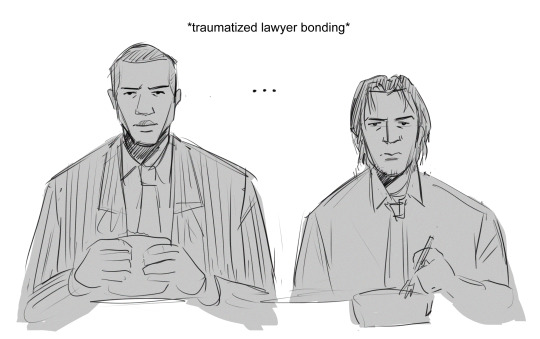
more rambling about a s5 au: lindsey comes back for a redemption arc to act as legal counsel for angel's team. this ostensibly gives gunn a reason to opt out of the lawyer operation, but he does it anyway because he doesn't trust lindsey not to fuck them over.

lindsey acts as a moral foil to gunn, who comes to believe his necessary contribution to the team (since he's no longer their only lawyer) is being the defender of the group's principles while working at w&h. they frequently butt heads while working on a case, but eventually develop a begrudging respect of each other's respective strengths.
this hostile-to-friendly-rivalry arc is tested when it comes out that w&h was responsible for some demon problem that's been plaguing gunn's home community. gunn has, unbeknownst to himself, been somehow contributing to it while working at w&h; lindsey knowingly contributed to it when he was last working there as a lawyer. lindsey is forced to confront who he was, while gunn is forced to confront who he’s becoming.
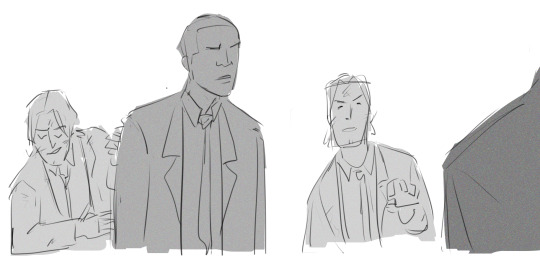
since he was involved in the project, lindsey uses his insider knowledge to help come up with a plan to fix the problem. they execute it, something goes wrong, and lindsey risks his life to ensure the plan goes off successfully. he expects congratulations and a pat on the back from gunn, but gunn isn't interested in absolving lindsey's sins (or his own), and their warming relationship freezes over.
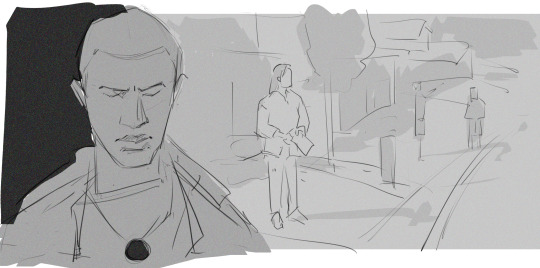
at some point, gunn lets himself get taken by the senior partners in an effort to deal with his guilt over various lapses in judgment/perceived moral failures. during their rescue mission to the holding dimension, lindsey stays behind in gunn's place so he can escape, assuring gunn that he's the lawyer the team needs right now. their mutual arcs culminate in lindsey rejecting the idea that redemption is done for recognition, and gunn rejecting the idea that guilt/self-punishment is inherently redemptive.
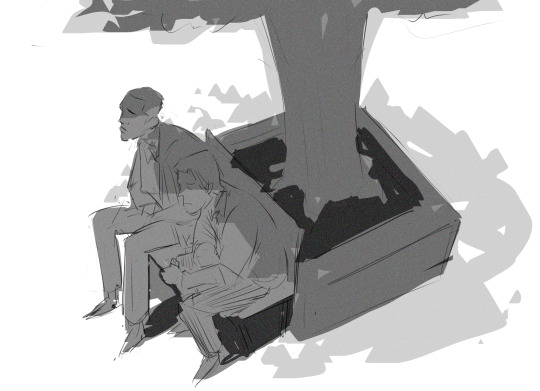
eventually after being busted out by illyria, lindsey is there to empathize with gunn about losing parts of yourself (body, mind, and/or soul) to w&h, relationships to power when you've grown up without it, and what it means to live with the consequences of your actions. both of them reflect on the nature of redemption/forgiveness/intent as they grapple with how to own up to an appropriate share of the blame.
#imagine i'm explaining this to you like the charlie day pepe sylvia scene#now let's talk about two characters who have barely interacted can we talk about two characters who have barely interacted#angel the series#ats#charles gunn#lindsey mcdonald#i think it's about two people who have grown up with a front row seat to how people with power will use it to step on others#the difference being that gunn thinks 'i need to be strong so i don't let people in power fuck over me or my own'#while lindsey thinks 'i need to BE those people in power'#also lindsey's appearance is a big PITA to gunn because he's a reminder that to anyone looking from the outside#gunn now looks a lot like the same evil guys in suits that he once fought against#which also reflects some of the themes in s5 more broadly! can they do good while working within evil inc or will they be corrupted etc#plus there's a lot of parallels to what's going on with spike and angel#art
84 notes
·
View notes
Text
“When I lobby for the inner life as a sacred site, as a touchstone, as a place of repair, as our integrity, as our private dialogue with our developing self, as our conscience and moral compass, as the joy of discovery, as deep connection with the known and unknown worlds of both experience and imagination, as the part of us we feel will not die, because in some sense it is passed on - as wisdom, as goodness, as an inter-generational touch across time, as the best of us, not least because it resists too much exposure to light, although it is light. The inner life is shy of too many visitors, but it is where we go to commune with ourselves, where we meet with the part of us that is both stillness and vibrant. A clear sound on a cold night.
When I lobby for the inner life it is because it must be nurtured. Nurtured by nature and culture - the twin pillars of humanity here on earth; our connection with this planet, and with the civilisations we have created, their glories of art and architecture, of science and philosophy. We create worlds - inner worlds and outer worlds - and we need to live in both those worlds because we are born hybrids.
[...] We are contemplatives and doers. We imagine and we build. We get our hands dirty, yet we rise above it all, star-dreamers and shit-shovellers. Creatures of beauty, as well as ugliness and fear. Terrible failure. Impossible success.”
— Jeanette Winterson, 12 Bytes: How We Got Here. Where We Might Go Next
430 notes
·
View notes
Note
I know the answer could possibly be a spoiler but
Is Janus meant to be a villain or not??? I'm assuming they are because they literally admitted to MURDERING clones we didn't see because they were "genetically inferior" (obvious disgusting behavior) and have generally been an extremely toxic presence in the lives of the other characters. but you've been giving kinda mixed signals?? I know there's nuance but I'm. Worried. Because I've seen commewnity artists reveal some very ableist and/or abuse-endorsing behavior/beliefs under a friendly facade and it's concerning me. I don't think YOU would do that, but a surprising amount of people completely missed the message of the first pokemon movie so. Idk I'm worried.
Firstly, if anything I create comes off as ableist and/or abuse endorsing that is ENTIRELY unintentional and does not reflect my views at all. Apologies if you feel that way but know it was never my intent to give off that vibe.
Under a read more because this got a bit long…
To put it very simply, Janus is not meant to be a villain. Janus was never meant to be an antagonizing force and if they come off as such then that is a failure on my part. I’ll do my best to address your concerns but again apologize if my explanations don’t clear it up 😔
Please keep in mind Janus stems a lot from the original translation of the first movie, where Mew does see clones as inferior beings. I won’t deny that originally this was Janus’ mindset when first introduced. This isn’t a view current Janus holds and I need this to be understood. They’ve grown since their introduction.
Though yes Janus did hold this view, it’s become very complex given their nature. Janus is parent to all life, even clones. They weren’t happy about the clones existing, but this stemmed a lot more from humans and their intentions which, more often than not, have never been good.
On an semi-related note, despite being more aggressive towards human made clones due to what corruption humans could pass onto them, Janus was shown to be (at the very least since they had not gone through any development yet) tolerant of Mnemosyne, even respecting their desire to live peacefully and offering to train them so they would be prepared when the mittens came.
Apologies if I am wrong, but I’m a bit confused as to what you mean by them being an extremely toxic presence. While admittedly Janus is not the traditional kind and bubbly many seem to expect from Mew characters, they haven’t gone out of their way to be an extremely toxic presence. If anything they’ve taken a more neutral/passive but positive leaning position. They’ve helped Mnemosyne, they’ve helped Calliope, they’ve helped Bellatrix, they’ve begun to put forth the effort to actually be in their son and granddaughter’s lives despite their rough history. Janus is trying to be better.
Unfortunately Janus is a character I fear I will never be able to portray correctly because they have a viewpoint that no one could ever hope to experience/understand. They’re old, older than time itself. Their perception of time and morality are complicated, yet at the same time they’re so detached from the mortal experience that they’re like an infant when it comes to their understanding of the complexities of life. However they’re allowing themself, through becoming involved in those complexities via the Mirage Island crew, to grow and learn.
I understand if you hate Janus for what they did and do not forgive them, I’m not asking that of you. All I ask is that you understand Janus is a deeply complex character, but they were never meant to come off antagonistic towards the Mirage Island crew, especially at this point in the story.
26 notes
·
View notes
Text
Mori Ogai; kindness and philosophy.
Mori is a very interesting character, and with that it comes the complexity of the character, since he is a complex character and not too much is known about him, its pretty often people in the fandom mischaracterizes Mori, so let’s talk about his kindness first.

In the official BSD guidebook, it is said that his strength is kindness and that his weakness is that he is uncertain whether he truly has the confidence of his subordinates.
Kindness is being selfless, caring, considerate and generous, is mori any of those things…? Actually yes. First let’s go with the selfless definition.
Selfless is being more concerned with the needs and wishes of others than with our own, unselfishness. Mori has shown to be concerned about Yokohama and the port mafia more than being selfish by just focusing on own needs, he has textually became the boss and therefore slave of the own organization, everything he does is for the better of Yokohama and the pm, Mori even helped Atsushi in his debut appearance despite it not giving any benefits to himself, there was no need to save Tanizaki and help Atsushi at all, yet he did.
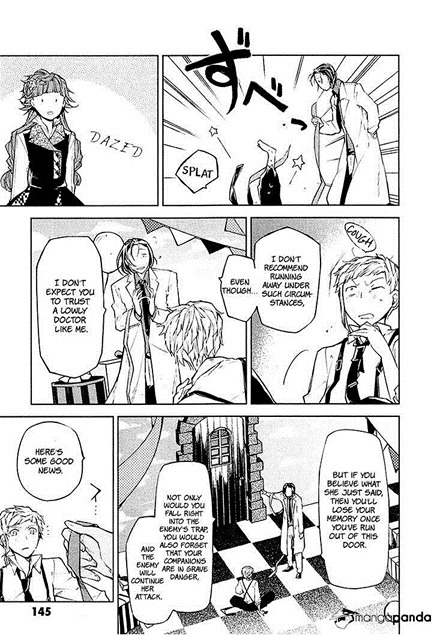

He is caring towards those who are in the pm, even though some may die in missions he sent them to, he is shown to be sad when they die WITHOUT a reason, more than a hundred of his subordinates died because of a mission and he griefs over them because there wasn’t a good reason for them to die, after all mori is called “He who fell out to the optimal solution” isn’t he?
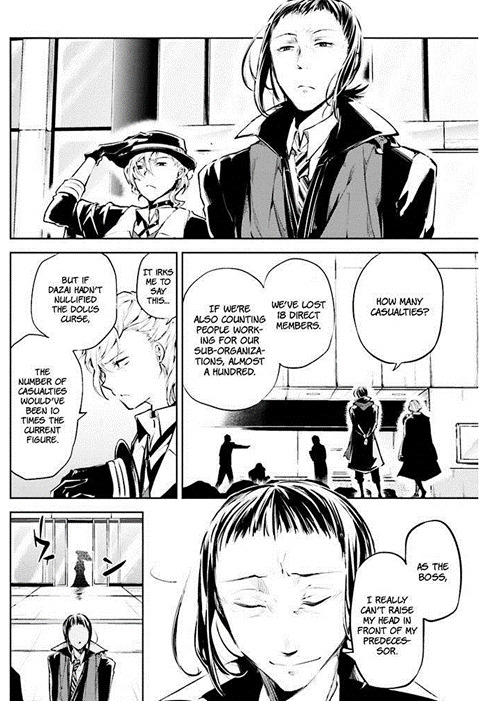
He is considerate towards (surprise) the pm and Yokohama, he puts Yokohama above EVERYTHING, even above personal wishes or needs, not to mention that he was generous to Higuchi admitting that Higuchi wasn’t suitable for the job but yet let her stay.
Now that the kindness topic is off the table, let’s go with his mindset and philosophy.
The philosophy that would suit him the best would be Niccolò Machiavelli’s philosophy. Niccolò Machiavelli thought that the end justified the means fully, he also thought that it was best to be both loved and feared, yet the two rarely go along, and anyone compelled to choose will find greater security in being feared than in loved, but why? Because if people love you, they can still do things against you or your ideals, but if they fear you, they won’t.
Despite Niccolò not mentioning the word ‘philosophy’ in The prince or The discourses the word philosopher does appear (once) in The prince and 3 times in The discourses, Niccolò is seen as a philosopher himself by a lot of people, lets dive into his philosophy.
Niccolò thought that it would be excellent if a ruler had morals and all good things and none of the bad, but since it’s the nature of life that you cant have or practice al those qualities all of the time, a ruler must take care to avoid the disgrace that goes with the kind of failings that could make him lose his position, just as Mori thinks; the end justifies the means, if a ruler had morals it would be good, but it can’t be possible or it will lead to failure, it just isn’t possible, it isn’t affective.
Mori isn’t good on terms of morality, which may be contradictive to the first part where we were discussing kindness, however Mori is kind not because its just natural and no other intentions than good, he manipulates those people he is kind to, though not always, most of the time he manipulates. This is related to another thing Niccolò thought, was that you could be good, have morals, but not too much because its ineffective, you cannot be good because for you to be a good leader most of the time you have to be cruel, going back to the love and fear, you cannot control how or who people love but you can control who they fear. Have goodness is good, its good but its simply not affective, no matter how much people love you or claim they do, they can always lie, so why not lie to them too? Its better to be feared than lied that they supposedly love you but hate you and start conspiracies. People are cruel, selfish and deceiving, so why not be too?
A lot of people in bsd fear mori, others admire him, but almost none hate him, that shows how good of a leader mori is, and despite dazai and yosano hate him, yosano still fears him, and dazai didn’t always hate mori, dazai just started to hate mori because of what mori did with oda, yet dazai recognizes that it was the most logical solution, the only reason he ‘hates’ and I don’t think it can even be defined like that, I would say that its resentment, dazai wouldn’t kill mori, dazai has no wishes to become or even come back to the port mafia, and again that shows how good of a leader mori is.
Thank you for reading my analysis!
#bsd#bsd analysis#mori#how do i tag this#idk how to tag this#bungou stray dogs#niccolo machiavelli#mori ogai#mori analysis#is it obvious i like mori?#chuuya nakahara#ozaki kouyou#bsd dazai#philosophy#mori is kind#literary stray dogs
69 notes
·
View notes
Text
Oh I am fucking angry.
Dr. Edwin Leap (yes, I will call you out by name because you published your bullshit online for the whole world to see), thank you for almost comedically illustrating why so many patients are afraid of doctors.
You do not ever get to think of your patients as other. They are your same flesh and blood; I don’t care how much you want to think of yourself as separate from those of us unwell. (I can tell how much disdain you hold for us just from this short article. We are failures, not good enough, not strong and morally pure like you are, hm?)
Healthcare can never, never, allow itself to other its patients. And yet, you publish an entire article calling sick people Homo infirmus and Homo fragilis? Your tone doesn’t come across very humorous, but even if it’s just supposed to be a silly little joke, explain to me why the fuck you think that would be okay.
Why the fuck would it be okay to say another person is not only not your same species but instead defined as other primarily by their illness?
And designated as such by you, a medical professional with direct influence on the lives and wellbeings of the very people you are dehumanizing?
Do you not see how terrifying that is? Do you not see why people would be afraid of you after just having read this piece?
And then you go on, boiling my blood:
“Homo fragilis, at least as a diagnostic category, begins earlier and earlier in life and often results not only in a tribe of people dependent on medications but also, ‘relying on the kindness of strangers.’ No, maybe better put, ‘demanding the kindness of strangers.’ These individuals require food, shelter, medication, affirmation, and often money from others because they cannot function in the wild. I’m not being mean; the causes are legion, from poor family structure to mental health challenges to social media.”
I cannot believe how many infuriating things you’ve said just in this paragraph alone, but I want to focus on the part that immediately washed me with deep shame. Unrightfully so. You have no right to make me feel ashamed, and yet, when you said “demanding” better captures my state of existence, it turned my stomach inside out.
Yes, I am disabled. I absolutely rely very heavily on other people. Yes, I require food, shelter, medication, affirmation, money. And so do you, christ. You aren’t better than us just because we need support from our communities. Getting support from those around us isn’t a crime, isn’t a wrongdoing, isn’t a moral failure.
You know what it is? Human.
Whether or not Margaret Mead actually said that a healed femur in recovered ancient remains was the earliest sign of civilization (we’re going to save the charged nature of this term for another time and for now just use it as a placeholder for consistent, steady, lasting community), there is a reason why people latch onto this story. There is a reason why it warms people’s hearts:
So many of us want to care* for people. So many of us want to have people care for us. So many people feel closer to others, to ourselves, to our own humanity when offering others care.
(*I am including all the vastly different ways we can show others care, love, support, respect, protection, encouragement, etc.)
And perhaps the most upsetting part is how close you are to understanding the problem while getting the most key pieces so, so wrong. You’re right, our current healthcare system cannot handle the amount of support patients need right now. But please, I beg you, could you consider for just one second that it is not the fault of the patients? Could you please not strip me of my humanity just because I need help to survive?
Fix the system. You’re right, there is a massive problem. But it’s not us. Next time you’re considering your “long-dormant zoology degree,” think twice and reflect a bit before publishing bullshit like this. Think about what it means to take care of those around you. Think about your own humanity.
#chronic illness#chronically ill#disability#vent post#so pissed off#also sir you are being mean hate to break it to you#anyway lots of love my fellow chronically ill and disabled people
22 notes
·
View notes
Text
Thoughts on Tim Bradford
I was thinking about some of the things we've seen about Tim over the years and boy, is it now making so much more sense. I know a lot of this has already been meta'd and have been very eloquently said. But I just needed to put my two cents in.
Let's start with what Isabelle said to Tim in 1x12. She never felt like she measured up to Tim because he saw things so black and white. Tim had no idea that she felt that way and never thought that about her. And I've always thought she was wrong and was just projecting her own sense of failure onto him. But now I'm re-thinking that stance. We know from 4x19 and 4x20 that Tim was involved in black ops when he was in Afghanistan. His whole "Reaper" persona is obviously from that time in his service. We know from so many things that have come out in the last couple of decades that those involved in those types of operations often blurred the lines of legal and moral. I think that once he returned stateside that his rigid moral code was part of how he dealt with his PTSD. He probably didn't even realize he was going that far. Think about it, he went from black ops to being "Eagle-eye", the cop that took every order literally and got his shop tagged while standing there. Someone who was involved in off book missions wouldn't naturally be that rigid. I think it was easy to fall back into that type of mindset because of his childhood. I'm sure he needed to have every duck in a row when he was younger to make sure he never did anything to set his dad off. But having seen and done some bad things in the midst of war, Tim had to default back to this to be able to integrate back into society. He's often scorned psychology over the years. So I imagine he dealt with the trauma of war on his own by becoming that black and white guy that Isabelle was talking about. It was only after Lucy entered his life and started challenging him to be a better man that he started to see those shades of grey that life is all about. Remember in 5x17 when he showed mercy to the Make a Dream kid's dad? Season 1 Tim would never. He even admitted that Lucy was a good influence. Chances are he would have mellowed over time, but I believe he still would have had a certain amount of rigidity. That's why he told Isabelle in 5x20 that Lucy was different. She showed him that he had to readjust his mindset to be a better man.
Another thing that struck me is how he is basically treating Lucy like his boot or aide right now. If it was Angela that knew something was up I could totally see it. He could possibly blow up her life and it wouldn't be worth it. She is his best friend, but not his life partner. I could even see it if this had happened circa 5x6 or 5x7 when Chenford was trying to find their way back to friendship. But things have changed. I know that "fierce protector" Tim will do anything to protect the people he loves. I mean he offered to take the fall for falsifying those after action reports so that his friend with a family wouldn't be affected. But Lucy is not a friend, not an old Army buddy or his boot or aide. She is the most important person in his life. The reason he has begun to heal from all of the trauma he has had to face. He can't hide this from her. I am hoping that he realizes that next episode. Cause as juicy as this angst is, I'm ready for it to be over.
One last thing, as hard as it is to watch them fighting, it's what Chenford needs. I think this is going to bring so much to the surface that they need to face. Now Lucy is getting a taste of what being the person left at home feels like when their partner is UC. I think Lucy is going to take Tim to task for the whole going behind her back with Grey thing. And they both are going to have to deal with their communication issues. I feel like they are only going to come out of this stronger.
49 notes
·
View notes
Text
"The road to hell is paved with good intentions." This was my thought when watching Miguel O'Hara in the movie Spiderman: across the spiderverse. A man concerned in preventing spatial collapse of dimensions and in turn using strict algorithm to determine the so called " canon events". All of it stemed from his failure of saving his adopted daughter because he made a genuine choice of replacing her father, to live a life of happiness only to be faced with destruction of the world. With that event, he turned cold and ruthless, determined with a singular mind to prevent such dimensional collapse.
With that in mind, Miguel O'hara considers our Miles Morales of earth 1610 an anomaly. Miles wasn't supposed to be spiderman. Peter Parker wasn't supposed to die. Yet circumstances beyond their control happened. And Peter Parker chose to save Miles and pass his legacy to him. Its wasn't Miles conscious choice to be a Spiderman. But circumstances led him to be one. So its not by his choice that Miles became Spiderman, but Miles still made that leap of faith and chose to uphold that legacy, and he did a damn fine job with it.
Therein comes an inherent concept of tragedy in the life of spider people. Every Spider person has suffered from a tragedy and it became a part of their life. Doesn't mean it always has to be. Why tragedy was part of their life because no one ever ran with the same pace. They had to carry the burden of saving people alone with no one to share it with. But if you can share that burden with someone, then tragedy can be prevented. It isnt tragedy that makes someone a hero, its their own wish and nature that makes them so.
There comes the canon event of Pavitr. In his canon, he has to choose saving that bus over that police officer, resulting in a tragedy in his life. That is if he was alone. But he had people to support him there. So Pavitr shouldn't be a spiderman since tragedy didn't strike him? Pavitr is a spiderman because he embodies the very concept of spiderman " The friendly neighborhood guy who has the responsibility of saving the little people because he has the power to do so."
Miguel in his aim of greater good, turned the act of saving into ruthless calculus. Let some people die for the greater good. And that destroys the concept of spiderman, the one who saves people because it is the right thing to do. It honestly reminds me of Kiritsugu Emiya.
So I hope by the end of series Miguel realises that act of saving shouldn't be a matter of ruthless calculus but a matter of our choice and responsibility.
#across the spiderverse#miguel o'hara#miles morales#gwen stacy#peter parker#spiderman#spider woman#pavitr prabhakar#hobie brown#across the spider verse spoilers
295 notes
·
View notes
Text
I've Started to Appreciate Trafalgar Law
But it is, in part, because I've obtained a fundamental insight into his character:
Law is a Seinen Protagonist Trapped in a Shonen Anime, and SALTY about it



Law has all protagonist tropes - he's got a tragic backstory. He loses his parents but is saved from what seems to be an inevitable villainy by a self-sacrificing mentor who dies... leaving Law stretched between revenge and living up to his savior's ideals.
He's got a hidden connection to the lineage that is destined to rock the world government - the Will of D
He's got a amazing but difficult power that is almost a win button, but curses him with the attention of super powerful enemies, hoping that they can compel him to give up his life for their eternal survival.
He's got a plucky crew with a memorable mascot. He tries to occupy a morally grey area and make difficult decisions, even though he's got a real heroic nature that he can't escape from. He uses his brain and his will to make the hard compromises to survive in a world that wants him dead.
It's just that he's not in a gritty anime, really - it's gritty enough, but with Luffy and the Straw Hats, no plan survives past dinner. And no failure is complete. Law is made to be a protagonist... just not for this particular show. And every time he's reminded of it, he sulks.
It's great.
46 notes
·
View notes
Text
Thematic Contradictions: Pinky, the Nature of Suffering, and the Brain.
A comment written on a youtube video showing the multiple backstories provided by the different iterations of PatB. Something written in the moment, free flow, with no research to back my claims. All made for the fun fun silly-williness of it all.
I did think others might enjoy it all the same, so sharing anyway.
Honestly, while contradictory in nature for the sake of making different origin parodies [a habit shared with shows like Darkwing Duck], there's plenty to work with in regards to coming up with a backstory. Even if you were to assume that Brain truly has lost it enough to believe all origins, there's still the running theme of having lost his innocence due to interference with humanity. That the trauma triggered the want and need for control to provide safety for himself [and Pinky]. I wouldn't call his want to take over the world [and thus humanity] to be seen as the example of his anger displacement. His anger displacement comes in the form of lashing out and getting overtly defensive when hitting roadblocks. It's a triggering of the feeling of failure, which in turn is internalized. His plan didn't fail, HE failed. Which in turn, he feels, is a jab at his intelligence. And if he isn't intelligent, the very thing granted and the outcome of why he suffered, then what was the point of it all? If he can't seek control, make the world a better place, was his suffering just a cruel act and not the marks of a greater destiny?
The answer in the end, of course, is one that philosophers have debated for a long time. But I argue that, outside of the love story of two mice [platonic or otherwise], the show handles topics like hope vs nihilism. Nihilism, in this case, demonstrated by both characters. Nothing matters, so why not take over the world? [It has to matter, or else why did he suffer?] Nothing matters, so why not have fun and be kind along the way?
Hope is also what enables them to continue their plans for world domination, while the fear of not being good enough is why Brain hardly ever tries a scheme more than once. Despite the fact part of learning comes with figuring out where one's mistakes occurred. But Brain has trouble learning on an emotional level, because he's closed off. That is where his learned helplessness comes into play. We've seen time and time again that he has trouble being vulnerable because that means losing any semblance of control. Control over himself, as well as passing on the reigns to have another help him through his pain. But what if he's rejected? What if his pain is mocked, or the other sees his vulnerability and validates the fact that he is a failure?
To want is to face the possibility of pain. To hope can lead to loss. And the Brain has faced enough of that for a life time.
And none of this even covers the new theme that reboot has made of Brain being just like the humans he sees as monsters. Of how he has continued the cycle of abuse through Julia's creation and downfall. When you see the mouse dine at the table of humanity, it becomes hard to distinguish one from another.
Luckily Pinky is there as Brain's moral anchor. And I like to believe that Brain can be better, can remember that nothing matters so why not be kind in spite of it?
31 notes
·
View notes
Text
A Look In The Mirror
She-Ra and the Princesses of Power exists in cycles and spirals, that's part of why I call it an tragedy trying desperately to happen. A ton of the tension is driven by the question of whether or not the characters will break out of the cycle. In other words, the story is about agency vs fate (a bit like Romeo and Juliet, I wonder what else the two have in common).
There are many ways to get across this theme, perhaps with carefully laid parallels and nuanced storytelling, both of which She-Ra does. But Signals takes a different, far less subtle approach. The episode tells the audience overtly what the series as a whole is about, and what exactly can subvert it.
Let me explain.
SPOILERS AHEAD: (She-Ra and the Princesses of Power, God Of War: 2018, God Of War: Ragnarök)
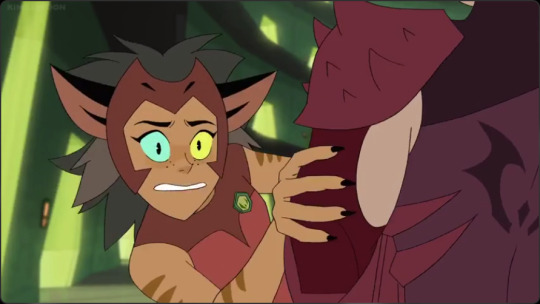
Signals opens after Entrapta's loyalties become general knowledge, and I would like to start with Bow's story in this episode, because it is a microcosm of how the story works as a whole. A vacancy is opened in a hierarchy and the new appointee tries to do things the way that their predecessor did. People become caricatures of those they see as powerful in their designated area and have to learn that being themself is just as useful, if not more so.
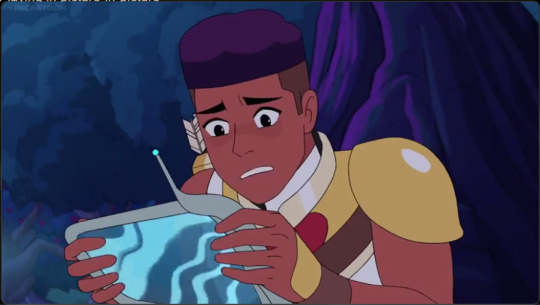
Bow, for example, seems convinced that failure is to be avoided or hidden. He has to be perfect, and able to fix anything. But, as Entrapta herself explains:
"There’s no reason to get huffy because an experiment fails. Failure is a vital part of scientific endeavor."
For all of her eccentricities, Entrapta is one of the wisest characters in the series, with only Razz outdoing her in that regard. (Swiftwind comes close). To that end, this is rather decent life advice, sometimes the best way to learn is to get something wrong and experience the consequences for that, instead of being either protected from consequence, or being punished for trying.
Hold on to this thought.
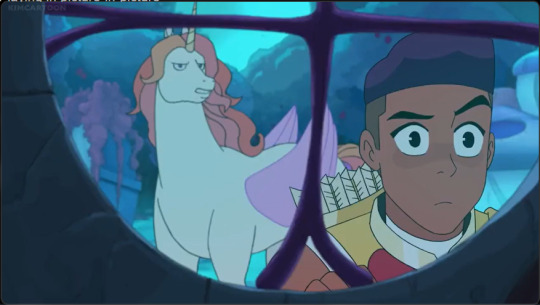
In essence, Bow is a relatively simple character by nature, he is necessary to balance out the entirety of the rest of the cast. But the word "relatively" is doing a lot of heavy lifting there, because Bow is nuanced, specifically in his relationship with obstacles.
Bow begins with a very simple worldview, but Entrapta single handedly complicates this time and time again. With her death, her allegiance, and her legacy. Bow realises that his worldview needs nuance when his top down perspective gets someone "killed", then he realises that his idea of binary morality is skewed when Entrapta defects, and here he learns about failure and tactics by trying to live up to her image.

Bow remains simple, in contrast with the theme park character development of Catra, Adora, and Glimmer, but he does learn and adapt.
So, Bow sets the baseline, to break from the cycle, you need to change. You need to stop trying to be someone else, and instead focus on being the best you that you can possibly be.

God Of War: 2018 and its sequel use the analogy of fate to describe this principle. Thor becomes an absent father because of his own father's abuse, which then leads to Magni and Modi being schmucks as the cycle continures. Odin explicitly gets to see what his future holds and ends up inadvertently causing it to come true in his attempts to subvert his fate.
Fatbrett on YouTube has a video titled Odin - A Deconstruction of Villainy that delves into the character as a whole, but I would like to zero in on Odin's core flaw and the message of the game as a whole. To change your fate is to change your nature. Odin is incapable of change, so the prophecy comes true.
But Kratos and Atreus do change, but their journey is towards learning to not avoid being themselves. Kratos' journey in God of War: 2018 is directly caused by not telling his son about his past, and Atreus spends the entirety of God of War: Ragnarök trying to be either his father, or Odin. The message of the story is this:
"Don't be sorry, be better"
Learn from your mistakes.

Adora takes this in an interesting direction, because it's genuinely difficult to see her as having much meaningful character development in series one at all, and I actually think this is a good thing. Because on a surface level, Adora goes from bad guy to good guy and escapes from an abusive relationship. But does she? The only thing that happens to the parental relationship is a pallet swap.
All Adora does in season one is change her surroundings, but the key part of that is her foundation. Adora spends season one surrounding herself with people who will enable that character development to flourish and not be broken down... and Light Hope. In season two, Adora starts making strides towards actual agency, and that is all because of the setup she has been doing.
I have gone into Depth as to how Light Hope is a bad influence in other posts, but this episode hammers home just how easily Adora internalises things. She keeps Shadow Weaver's tales of the Weeping, Headless, and Undead Princesses in her mind, for example, absorbed uncritically.
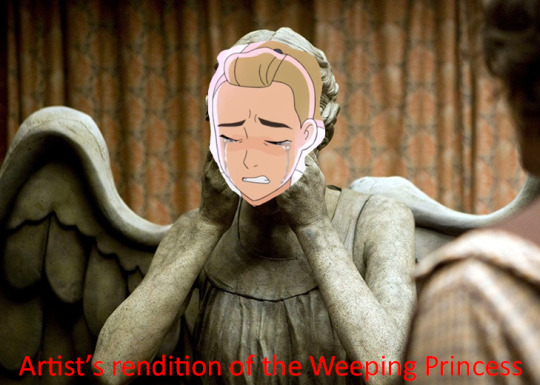
But Adora also keeps the obsessive blaming. She sees a problem and immediately attributes the cause of it to the Horde, a holdover from her time there, where she had the same attitude towards Princesses. In this instance, she's wrong, and the problem is more nuanced, and her assumptions get the better of her.

Speaking of assumptions, the first ones make an appearance in this episode, kind of. The messages that they leave behind give a glimpse into their lives that we haven't come close to getting before.
"I’ve been thinking of them as these big epic figures. But they’re regular people, sending messages to their loved ones."
The theme of cycles and living up to legacies continues with the worldbuilding of this story. Modern Etheria tends to visualise the First Ones as great and powerful and perfect, but they were just as human as the rest of the characters. Once again, those trying to mimic their predecessors exactly come up short.
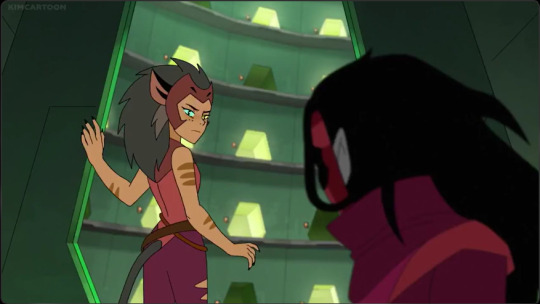
Over on the Horde side, Catra is going through a similar situation, she is trying to become Shadow Weaver, but coming up short because there was more the story than she realised. Shadow Weaver had to do paperwork, for example.
There's also the fact that she is still in the abusive environment. She still regularly visits Shadow Weaver, so the psychological bullying still happens, but she's also around Hordak, now. I said that Adora has just pallet swapped her situation, and I think Catra has done the same.
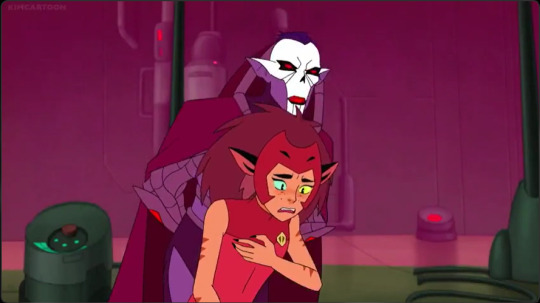
When Hordak takes the atmosphere out of the room, it is awful, and it's the moment in which Catra should realise that it doesn't matter how high up in the chain of command she goes, she will still be suffering. She should realise that she needs to get out of there for her own safety and sanity.
But she doesn't realise that. Instead, she applies what she has learned in her upbringing. She is convinced that all she has to do is succeed, and she will get that attention and fairness. Conditional acceptance is what she is used to, so she doesn't see anything out of the ordinary here.
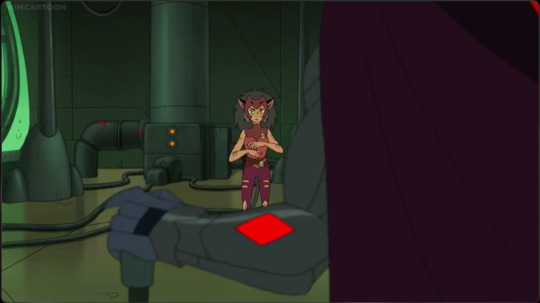
"Failure is when something ceases to serve a purpose. When that happens, it becomes worthless to me."
This is Hordak's worldview, and I hate to argue with a villain, but I think he's wrong there. If success is usefulness, and everything will eventually stop being useful to you, then you have a pretty sad life. If you judge everything by utility and don't care for relationships or things that just look and feel nice, then you are alone.
But on a broader, purely utilitarian perspective, this idea is bunk by that standard too. Failure as worthlessness is an objectively false idea, because mistakes are things to learn from. If something doesn't work, try again differently.
In other words:
"Failure is a vital part of scientific endeavor."
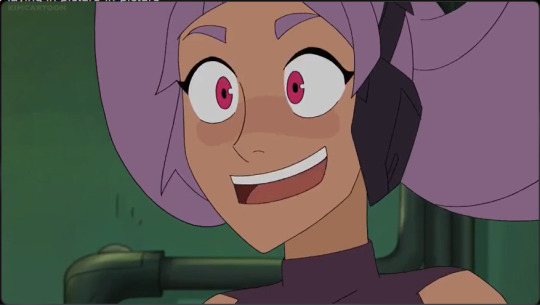
Entrapta is back, and this episode actually gives a glimpse into how to subvert the cycles, specifically through Entrapta and Hordak.
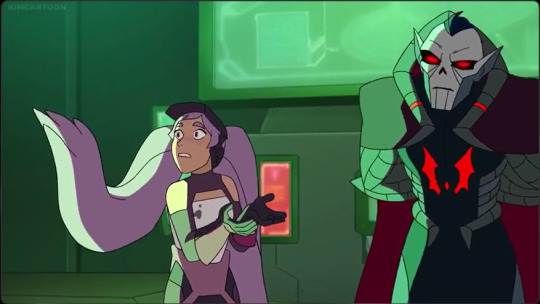
Firstly, Hordak has evidently been trying the experiment over and over again without learning anything. So Entrapta, by nature of her ability to adapt, makes the experiment work. It's a tiny metaphor for what I've been saying so far.
But Entrapta breaks through Hordak's barriers because of her sense of freedom. The best way to break free of a downward spiral is to start moving in a different direction, and Entrapta does that easily. The reason she so easily switches sides is because she isn't tied down by anything (not even morality). She can't even be imprisoned because she is impossible to contain. Entrapta is a free spirit, and I think that that is what the series is about, personal agency.
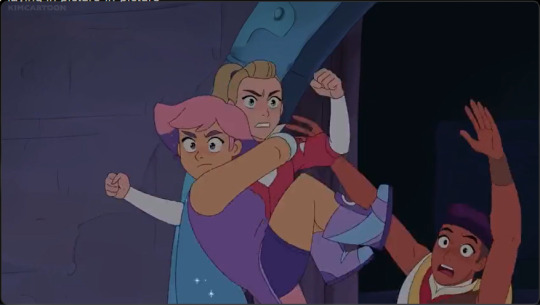
Catra and Adora are repeating the same story over and over again because they think they have no choice, that's what the tragedy of the series is, the two main characters are on a road to destruction and can't change direction. But the story isn't a tragedy, it avoids being one at the last possible moment when the characters finally realise that they have agency, and that thematic is foreshadowed right here, in Signals.
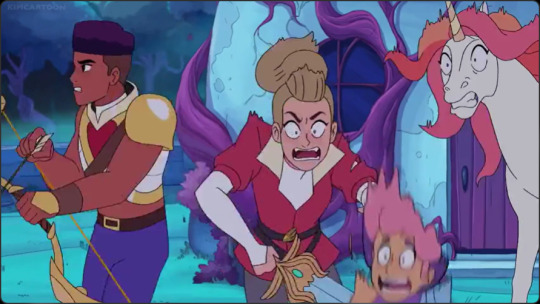
Final Thoughts
In my plan for this post, I wanted to bring up the Darksouls series, of all things, but I think I will save that idea for a later episode.
In any case, this episode manages to discuss some overarching philosophy, as well as explicitly state that this has happened before, this is a story about repetition, learn from your mistakes.
Also, the cinematography in this episode is really cool. It flies under the radar a lot, but the camera placement and movement really heighten the tension and vibe of this episode.
Next week, I will be talking about Roll With It, an episode that is near and dear to my heart for completely unbiased reasons. Definitely unbiased. Not bias there at all. So, stick around if that interests you.
Previous - Next
#rants#literary analysis#literature analysis#character analysis#what's so special about...?#she ra and the princesses of power#spop adora#spop#she ra#spop entrapta#spop bow#spop hordak#she ra catra#she ra spop#she ra adora#she ra bow#she ra entrapta#she ra princess of power#catra#adora#mermista can do no wrong#meta#meta analysis
41 notes
·
View notes
Text
No one noticed when Peter, the principal of the local high school, was writhing in the alley behind the gym when that thing pounced on him late in the afternoon. The kind director was known for his bright smile and his kind and hard-working nature. His curiosity doomed him, as that black thing, similar to a symbiote, attacked him and dragged him into an alley.
................................................
Hours earlier, in the new county jail, screams of pain and panic could be heard inside the building. In basement 3 of the prison the government carried out experiments of dubious morality with the most dangerous prisoners. They promised them that they would reduce their sentence if they collaborated, what the prisoners did not know is that no one had left there alive. Deckard Bell, the scientist in charge of the facility, had discovered a way to transform humans into symbiotes. Modifying their bodies in the process The applications would be endless. Until now only one had achieved it, Jenkins Hell, a 67-year-old man who had spent most of his life in prison, and would surely die there. Now it was just a black, slimy slime locked in a jar.
Jenkins was not stupid and knew perfectly well what the symbiotes were, what he was now and he couldn't be happier. The pain had been worth it, since now he could easily escape from prison. Even more so when that same day there was an electrical failure which allowed him to get out of his container and escape through the sewers. His new body was very malleable and he did it without problems. However, now he had a problem. He needed a host. A human body to hide in and that he could control. That he should be a person, preferably a man, who had a good body and a shitty character that he could break. Then he realized. His son, Peter Hell, would be perfect. He had inherited his good physical shape, and his mother's pathetic and weak mentality. He would be perfect. His son was 48 years old and apparently he was the director of the institute, it would be very easy to approach him.
..............................................
Peter fought fiercely against that thing, he didn't know why it had attacked him, hell he didn't even know what it was, he just squirmed and fought. After a long time of fighting that thing began to tear his clothes. His plaid shirt fell to the ground in pieces, and his pants followed. In a few seconds he was completely naked in an alley, showing off a tanned and well-defined body. Peter was terrified, that thing wanted to rape him, kill him maybe? He didn't know it, but he couldn't help but cry out of fear, fear for him and fear of leaving his family, his wife and his young children. That thing introduced a tendril into his ass which made him scream, and then another thick tendril entered his mouth. Peter fainted after a few seconds, while the symbiote wrapped itself around his body.
...........................................
A few minutes after the incident, footsteps were heard in the alley. Director Hell walked out slowly, with a smile from ear to ear and a new look that had nothing to do with the kind director.

Small ripples could still be seen on Director Hell's new leather jacket, almost as if it were alive.
-This is going to be fun-. Jenkins Hell said with the mouth and voice of his son
..............
It's my first story, I hope you like it. If this is well received maybe I'll make a second part.
37 notes
·
View notes